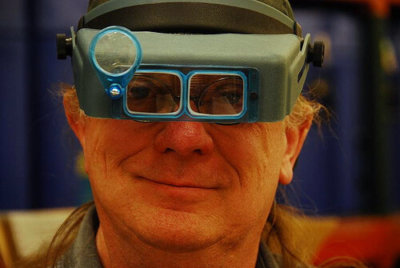High Expectations? 11 Ways to Make Sure They Work For and Not Against You

By: Roland Tanglao
by Andrea M. Darcy
High expectations are something we are taught are necessary if we are to have a ‘good’ life or real self-worth.
But too often high expectations are just a form of control. Instead of satisfaction, they can lead to self-judgement, feeling let down, stress, and low moods.
[Read our connected piece on How High Expectations Cause Stress and Depression to learn more. ]
11 Ways to have your expectations work for you and not against you
So how can you ensure that your expectations are high, but not so high they are holding you back? And that they are helping you, not hindering you?
1. Do an ‘expectation inventory’.
Not sure if your expectations are too high? Explained in detail in our adjoining piece on expectations, an inventory involves writing down and questioning the expectations you hold in each area of life. It also involves taking a day or two to pay close attention to the little things that upset you, as they are usually signs of hidden expectations not being met.
2. Match your expectations with your values.
Setting expectations that don’t align with who you really are, to your true personal values, leads to unconscious sabotage and deep dissatisfaction.
For example, if you have set the expectation you will be a millionaire by 40 but your real values are freedom and charity, you are likely working against yourself. How can you align your values to your expectations? Could you decide to make enough money you can start your own charity?

By: Karen
3. Recognise what others do offer, instead of wanting what they can’t.
How would your relationships change if you worked at noticing other people’s strengths, and what they do offer you, instead of focussing on what you expect them to offer you and how they disappoint you? If you took note of what they gave to you – their humour, their listening skills, their compassion – instead of focussing on their lack of organisation, or tendency to be a bit late?
4. Become aware of negative thinking patterns.
High expectations are often driven by a negative attitude towards life or yourself. “I expect this meeting to make me look good’ is linked to thoughts like, “I need to achieve to be liked”. “I expect this person to make me feel good” is linked to thoughts like, ‘I need others approval to feel good’.
Each time you notice an expectation, see if there is a negative thought or core belief you can dig out beneath it. And then just note that the negative thought is just that – a thought. Not a fact. If you discover you have a habit of constant negative thinking, you might want to consider a round of cognitive behavioural therapy (CBT), which helps you take control of the cycle of negative thoughts leading to negative actions and moods.
5. Monitor media intake.
We live in a world where corporations make good money off of your expectations, bombarding you with advertising created to make you believe you should expect even more. And social media then encourages us to compare ourselves to everyone else, so we raise our expectations even higher.
The media happily puts you on what is known in psychology as the ‘hedonic treadmill’ – a endless cycle of always needing more to feel happy, and always raising expectations once we reach them.
What would happen if you cut back on media consumption? For starters, try timing your usage – it might be eye-opening how much time you devote to taking in the opinions of others. Then try a week or two of cutting that time in half, and notice the difference.
6. Experiment with perspective.
When you feel life is not reaching your expectations, shift your seeing for a moment by trying a new new perspective. What would your five year-old self think of this? You on your death bed? A person living in poverty? Is this situation really as important as you think?
7. Practise mindfulness.
Expectations are born in the past, where we made assumptions about what was important. And expectations are then fed by a future vision of ourselves we deem as ‘better’ than what we already have.
Mindfulness, on the other hand, is about the present moment. It trains you to focus on what are feeling, thinking, and experiencing right here and now. And it is in the present where life is the most surprising.
Mindfulness has the added bonus of lowering reactivity. The more we expect from others and life, the more we tend to overreact when we don’t get what we want. With enough practice, mindfulness helps you recognise reactive feelings before you take action on them.
8. Get grateful.
We’ve all heard of the art of gratitude by now. But have you really tried it? It’s proven by research to improve moods. Instead of focusing on how life isn’t matching your high expectations, spend a week writing down ten things a day that actually are going well in your life.
9. Set realistic goals.
Goals are great, but constantly setting ones that are hard to reach can be a way to self-sabotage and confirm hidden core beliefs you are a failure. Learn about setting SMART goals, and if that’s old hat, learn how to troubleshoot SMART goals even further.
10. Be open to the element of surprise.
High expectations can be like blinders. You block out great surprises standing right next to you.
Not sure how to be open to surprise? Leave more ‘unplanned’ time in your life. Try a night where you walk out your door with no plan whatsoever. No restaurant booking, no agenda. Attend a network event and talk to three people who are not on your carefully researched list of who you need to connect with. Or go on a date without interviewing the other person with your list of ‘potential spouse’ questions for a change. What might happen?
11. Learn what you can control
Curveballs come in life. Instead of trying to control what happens, focus on the only thing you can control – your reactions and responses. If you find this hard, if you are impulsive, or feel that your emotions leave you acting out, then consider a round of CBT therapy. It focuses on helping you recognise and take charge of the link between your thoughts, feelings, and actions.
Conclusion
As humans, we are hardwired to want things. But consider trading unrealistic expectations for realistic ones, or expectation for hope. What expectation are you ready to let go of? How can you expect less and hope for more?
If you feel panicky at the thought of letting go of expectations, or suspect your demands on life or others might be hiding things like perfectionism, low self-esteem, or just a general fear of life you can’t explain, don’t overlook the power of seeking support.
Harley Therapy connects you with a team of elite psychotherapists in central London. On a budget? Use our sister therapy booking site of UK-wide registered therapists for every price point.
 Andrea M. Darcy is a mental health and wellbeing expert and personal development teacher. With training in person-centred counselling and coaching, she often writes about trauma and relationships. Find her on Instagram @am_darcy
Andrea M. Darcy is a mental health and wellbeing expert and personal development teacher. With training in person-centred counselling and coaching, she often writes about trauma and relationships. Find her on Instagram @am_darcy






the whole high expectations thing is just not sinking in ive read so much but am none the wiser